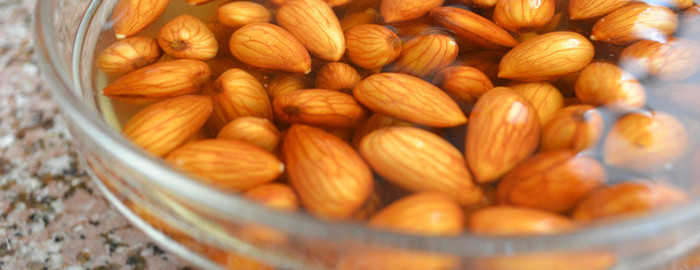Soaking Nuts and Seeds
There are many health benefits to soaking nuts and seeds. Some of these benefits include reduced phytic acid, to neutralize enzyme inhibitors and encourage the production of beneficial enzymes while neutralizing toxin in the colon—keeping it clean. It also makes the proteins more absorbable by the body, reduces tannins, and it can break down gluten, easing digestion and vitamin absorption.
Raw nuts or seeds are an easy on-the-go snack. What most people do not know is that raw nuts and seeds have enzyme inhibitors within them, toxic substances such as tannic acid & goitrogens and phytic acid for their protection.
These may be terms we have not heard before, so let’s break them down.
Phytic acid is a compound that binds itself to minerals like iron, magnesium, zinc, calcium, manganese and chromium in the gut, which prevents the digestive system’s ability to break the nut or seed or grain down properly. If you have seen undigested bits of nuts or seed in your stool, this is why.
Individuals with anemia, low zinc levels, osteoporosis and other illness related to low mineral absorption could benefit from soaking nuts before consuming. When soaking nuts, the phytic acid is broken down and nutritional value and digestion is increased.
Goitrogens suppress the proper functioning of the thyroid gland by interfering with iodine uptake. Soaking nuts help reduce goitrogens and increases the necessary minerals needed for a healthy thyroid.
Enzyme inhibitors neutralize vital enzymes the body naturally produces, leading to illnesses and an enzyme-depleted gut. Enzymes are essential for optimal functioning of the body and used in thousands of chemical reactions throughout the body.
Bloating, constipation, diarrhea, heartburn, irritable bowels and gas are signs of enzyme deficiencies.
Soaking nuts and dehydrating these delicious morsels can improve their taste and texture.
Soaking Nuts, Seeds & Legumes
How do I go about soaking nuts and seeds?
Dissolve one tablespoon of salt in water, pour over nuts or seeds, using just enough water to cover. Leave in a warm place for at least 7 hours, preferably overnight. Drain in a colander. Discard the water used for soaking, never reuse it. Spread nuts/seeds on a stainless steel pan. Place in a warm 150℉, turning occasionally, until thoroughly dry and crisp. The longer they soak, the longer it takes to dry. Use an oven thermometer to keep track of the temperature. At 200℉, enzymes will be destroyed. A dehydrator is the preferred method of drying; it will take 12-24 hours until completely dry. Store in an airtight container.
*If you want an extra boost, add cayenne pepper before you begin the drying process.
Soaking nuts and seeds is easy. You now have the info needed to begin soaking nuts and seeds at home. In the comments below, let us know how you like soaking nuts and seeds better than the raw alternative and if you notice a difference after eating them. Share this post with a friend or loved on that could benefit from this information.
Resource: FoodMatters




Leave a Reply
Want to join the discussion?Feel free to contribute!